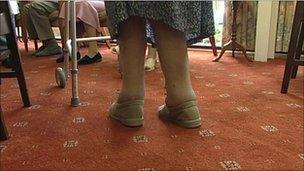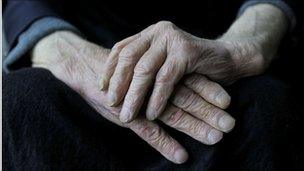Caring for the elderly: an expert answers your questions
- Published

Philip Spiers guides you through the very complicated rules on paying for care
The vexed question of how to pay for the care of the elderly, and adults with disabilities, has been highlighted by the recent recommendations of the Dilnot Commission.
In his independent report to the government on reforming the system in England, Andrew Dilnot said that individuals should not have to pay more than the first £35,000 or so of their care costs (as opposed to their so-called hotel costs) during their remaining lifetimes.
And they should not have to pay even that if their assets, including their homes, were worth less than £100,000.
We asked you to submit questions about paying for care to Philip Spiers, of the advice service FirstStop. Here are his answers.
Why are we not actively encouraging elderly people's families to help care for them? Surely it is cheaper to pay them a wage than it is to fund care homes? I understand some have complex needs. But, as my time as a carer has taught me, most want company and a cup of tea and a hot meal. Sarah Moorby, Kendal.
Informal carers provide more support than any government could afford to pay for. The most recent research from the charity Carers UK estimates that there are more than six million carers in the UK. The care and support they provide to help people remain safely in their own homes is valued at a staggering £119bn per year, which is far more than the annual cost of all aspects of the NHS.
So on an individual basis, it might seem a cheaper option to pay a carer than a care home, but to pay all carers would not be feasible.
The other aspect of course is that most councils will only provide care packages for people who have substantial or higher care needs (this also being a recommendation of the Dilnot Commission) leaving people with low or moderate care needs to rely on family and friends, pay for it themselves or do without.
The Dilnot Commission proposed a threshold of £100,000 in assets before someone has to fund their own care, plus a maximum of possibly £35,000 in lifetime spending by someone on their own care costs. What about the "hotel costs" of care or residential care of approximately £10,000 per annum? Is this to be found from the threshold savings (the £100,000) or is this free after the £35,000 care costs have been paid? "Downeagle".
The commission considers the £10,000 "hotel costs" could be afforded out of income, given that the median net income of single people aged over 65 year is £11,284.
Even those people without any capital at all would have to contribute their income to the accommodation costs, less a small amount retained for personal expenses, currently £22.60 per week in England.
Also, present rules state that if your accommodation costs are more than the local authority is prepared to support, then you cannot top up out of your capital if it is below the means test threshold. Whether this rule would continue if the commission's recommendations were implemented remains to be seen.
The NHS and social services are under resourced! No wonder they struggle to give adequate care. "Concerned".

The Dilnot Commission's proposals are specifically about England
This is clearly so and recent polls have suggested that people are quite prepared to contribute towards a social care system in partnership with government. It requires the government to look at ways of funding the shortfall, which has been estimated previously at a cost of around £4bn compared with the £1.7bn estimated to implement the Dilnot Commission's recommendations.
My father died a few years ago and left his half of the jointly owned home (with my mother) to their four children in his will. The property is worth approximately £140,000. My mother currently lives on her own in the house but has developed Alzheimer's and no doubt will eventually no longer to be able to look after herself and may have to go into a home. At present we have not updated the ownership of the house on the deeds. What will happen to the proceeds from the house should we have to sell it to pay for my mothers care? Will we all be able to claim our 1/8th of the funds and just use my mother's 50% or will we have to use the full funds to pay for my mother's care? In short should we transfer the ownership now before this occurs? We have obtained power of attorney over my mother's affairs. Gordon, Cardiff.
In conducting the means test for care, the local authority will take into account the value of your mother's property. However, although she might be the legal owner, they must also look at who the beneficial owners are, as this may be different to the legal owner. So in the circumstances you describe your beneficial interest should be ignored.
My wife's uncle, for whom we have Power of Attorney, recently fell, had a spell in hospital and is now in residential care on the recommendation of the Surrey County Council (SCC) and hospital care teams. He owns his sheltered flat and has less than £14,000 capital. The 12-week disregard applies. For the first 12 weeks, all of his income (except for the personal expenses allowance and the pension savings disregard) will be taken to pay his contribution for the care home fees. After 12 weeks, the full cost of the care home fees will be accrued under the deferred payment scheme to be paid off when the flat is sold. However, SCC is not (so far) exercising its discretion to leave him sufficient income to pay the standing charges in his sheltered development. The management company at the block of flats requires ground rent and management charges to be paid (approximately £2,200 a year). Despite my wife's uncle not being there, they have declined to reduce these charges or to allow the charges to accrue against the property to be paid off when the flat is sold. As his attorneys, how would you advise my wife and I to proceed? David Lyle, Godstone, Surrey.
You are correct: the council does have the discretion under Section 22(4) of the National Assistance Act of 1948 to allow a different amount from that prescribed for personal expenses in special circumstances. I would recommend that you make a formal complaint against the council. Your argument should be that allowing your wife's uncle to retain the money he needs will cost them nothing after the 12-week disregard period. Then it will just be added to the loan.
For the first 12 weeks, when the council is supporting him, it is unlikely that they will concede because this is an additional cost to them. If he has not done so already, then he should claim attendance allowance towards his care costs which he will be entitled to once he is meeting the full cost himself after the 12-week council funding. Attendance allowance is non-means tested and non-taxable and amounts to £73.60 per week.
If his property is on the market, it is disregarded for pension credit purposes, so if claiming attendance allowance, he would also be entitled to the pension credit severe disability addition of £55.30 per week.
These benefits together should be adequate to meet his service charges, so perhaps the management company can be patient and wait until they are in payment. There is a condition that you must have had care needs for at least six months before attendance allowance is granted, so the earlier you can establish when his care needs arose, the better.
Under the proposed Dilnot arrangements, what would be done to control for quality of care? For example, say I have cancer and am given six months to live, but need a care home. I know that I have to foot the bill for the first £35,000 and then the state pays. So I choose a marvellous residential care home with all mod cons and personal; care which charges £140,000 per year. Would the tax payer pick up the tab to keep me in such luxury after I survive three months? Also what about nursing care? Would that continue to be free? How do you discriminate between nursing care and social care? Nicita, Abingdon.

Andrew Dilnot suggested a lifetime cap of about £35,000 on paying towards your own care
There is a very fine line between free NHS continuing care and means-tested social care. If your care needs are assessed to be primarily health care needs, then the NHS could pick up the costs and fund a placement in a care home of their choosing. The NHS is also responsible for palliative care, so if you were terminally ill, it should pick up the costs.
As regards the proposed £35,000 cap, councils will set an amount they consider reasonable as a weekly cost and this will be the figure used to notionally calculate when the cap has been reached. You would not be able to reach the cap earlier by choosing more expensive care.
Once the cap is reached, if you were in a care home more expensive than the council would normally pay for, you would have to find a way of paying the difference yourself.
How come many private care homes in the UK employ unskilled cheap labour from overseas countries? Lewis Fitzroy, Cardiff.
In recent years, there has been a strong shift by care home operators to providing training for care workers to reach levels of NVQ that demonstrate caring skills. The care home sector would argue that councils do not pay them sufficient rates to allow them to pay more than the minimum wage for carers.
The Care Quality Commission (CQC) is responsible for registering providers of care services and, through monitoring, ensuring they continue to meet essential standards of quality and safety.
Why should those who save and pay tax all their lives have to pay for care in old age when others who waste and do not plan ahead get their care free? Tom C.
Funding for care home placements has been means tested since 1948. The principal being that those who can afford to pay should do so, with a safety net for those who do not have the means. This is how a welfare state works, but it also means that those who are able to afford it have a greater choice of where they may wish to spend the end of their lives.
My mother has been in a private residential care home for the last two and a half years and her savings will last approximately another year. My mother is in good health, apart from dementia, and could live for many more years. What will happen when her savings run out? It would be extremely upsetting for her to have to move, and who will fund it then? Janice Pallett, Brentwood, Essex.

For state support in England, an individual is judged on two criteria - means and needs
Before your mother's capital depletes to the means test threshold limit, currently £23,250 in England, you should ensure her care needs are assessed by her local authority. Once she reaches the means test threshold, they would be obliged to contribute towards her care costs if she is assessed as needing the care.
If the home costs more than the council are prepared to pay, you could argue that part of her assessed needs should be emotional needs and moving her to alternative cheaper accommodation does not match those needs.
If that fails, either the care home owner would have to reduce its fees to the local authority rate, or a third party would have to be found to top up. Your mother would not be allowed to top up from her remaining capital. Some benevolent funds assist with top-ups.
My mother has dementia. She has been in a care home in Somerset for two years. I live in London and have moved her to a care home in Surrey. She has had to sell her house to pay fees. If my mother runs out of money, would the local authority pick up the bill, despite the fact that she has only lived in Surrey since November? Lynn Voller, London.
If your mother moved to the care home in Surrey of her own volition, then she becomes a resident of Surrey and that council's responsibility. If she was assessed and placed in the care home by Somerset social services, then it would become their responsibility, should her money run out. To make sure your mother is claiming all she is entitled to whilst self-funding her care call the FirstStop Care Advice Line, external on 0800 377 70 70 and ask for Factsheet 1: Self-Funding Care Home Fees., external
It seems particularly unfair that where people do have capital and property values taking them above the threshold, they should pay tax on any pension or investment or deposit income which goes straight to the residential or nursing home. A system should be devised whereby, if the pension or income is paid directly to the nursing home, it could be received gross, as is the case with a purchased life annuity. Lorna Brown, Wales.
It is true that if you purchase an "immediate need care fee payment plan" to cover your shortfall in income, the monthly payments from the plan are paid tax-free if paid direct to the care provider however. As with many annuities, a substantial amount of the payment is deemed to be return of capital for tax purposes, so the amount being paid tax free is minimal.
The government might find the cost of making such a tax concession, applying to all care home residents' income, prohibitively expensive.
I have privately funded my father in an Alzheimer's specialist care home for two years, at approximately £28,000 per year. If the Dilnot report is implemented and a ceiling is placed on the amount of paid-for care as suggested at £35,000 in total, does this mean, having already paid over this threshold, my father's future care would be funded by the government? Terry Brown, Cleethorpes.
It is not clear that if the Dilnot Commission's recommendations were implemented, they would become retrospective and people who have already paid for care for a period would have this counted towards their cap. Such a transitional arrangement would certainly seem fair.
The opinions expressed are those of the author and are not held by the BBC unless specifically stated. The material is for general information only and does not constitute investment, tax, legal or other form of advice. You should not rely on this information to make (or refrain from making) any decisions. Links to external sites are for information only and do not constitute endorsement. Always obtain independent, professional advice for your own particular situation.
- Published5 July 2011
- Published4 July 2011
- Published4 July 2011
- Published11 February 2013
- Published10 July 2012